By Ina Lee, Communications Director, Yemen Relief and Reconstruction Foundation
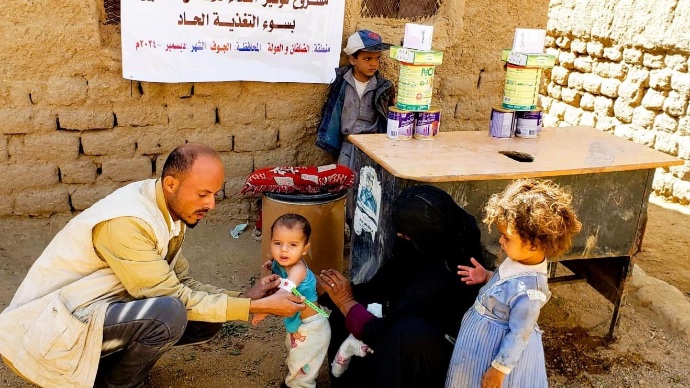
Child being tested for malnutrition. Photo: YRRF
At Yemen Relief and Reconstruction Foundation (YRRF), we are on the front lines of one of the world’s most urgent health crises. In a country where nearly 80 percent of the population depends on humanitarian aid and the health system is stretched beyond its limits, our work is rooted in one clear goal: to protect life and restore dignity.
The challenges are immense. After nearly a decade of conflict, much of Yemen’s health infrastructure has been damaged or completely destroyed. Families struggle to access food, medicine, and clean water. Yet every day, our teams and partners find practical ways to deliver care by drawing on deep local knowledge and long-standing community trust. Our efforts are grounded in the belief that health is a basic human right and support the broader goal of ensuring health and well-being for all, as outlined in Sustainable Development Goal 3.
Treating Childhood Malnutrition in Underserved Areas
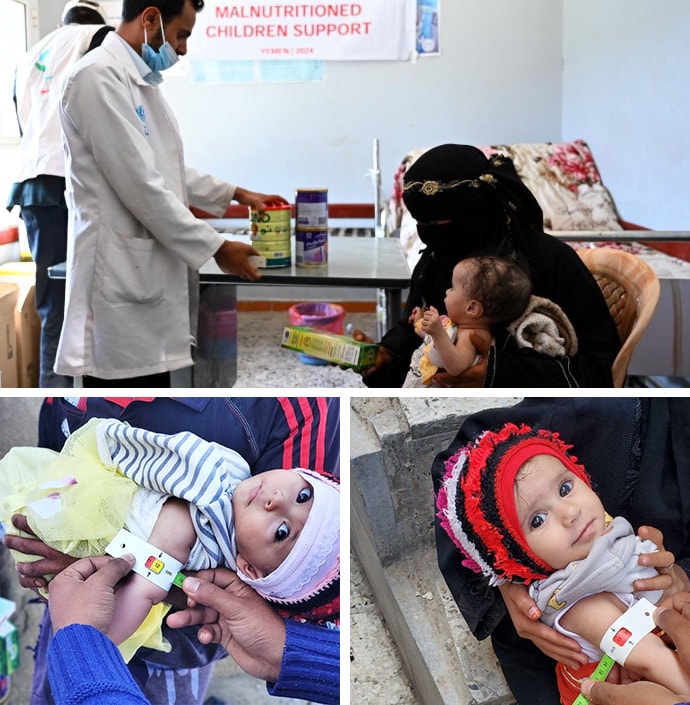
Malnourished children are being treated in multiple centers. Photos: YRRF
Malnutrition remains one of the most devastating consequences of Yemen’s humanitarian crisis. Children are the most vulnerable, often arriving at clinics too weak to eat or speak. In partnership with Ibn Khaldoun Hospital in Lahj, we supported the treatment of more than 450 children suffering from severe acute malnutrition last year. Recovery involved more than just food and medicine; it also included follow-up care and support for families.
At the Al-Buraiqah Health Center in Aden, we helped launch a six-month initiative that provided therapeutic food, hygiene kits, and caregiver education. Across six governorates, we also delivered nutrition assistance to 1,000 children on a monthly basis. These programs reach families in remote areas and offer consistent, trusted care where other systems often fall short.
Training Midwives to Expand Maternal Care Access
Access to maternal care remains out of reach for many women in Yemen. Giving birth safely is far from guaranteed, especially in communities without functioning health facilities. To help close this gap, we launched a three-year midwifery diploma program to train women from underserved areas. Sixteen of the twenty midwives enrolled in the program graduated and are now working in their own communities, offering prenatal checkups, attending births, and providing postnatal care.
These midwives are often the only source of maternal care for miles. Their presence increases the odds of safe deliveries and ensures that more women receive timely prenatal and postnatal care. This is how we move toward health systems that are sustainable and centered on those who know their communities best.
Responding to Critical Needs in Emergencies
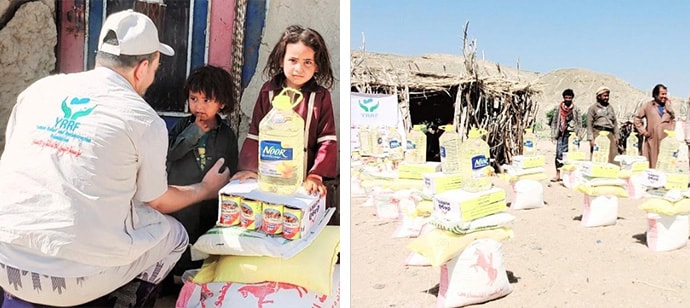
Delivering aid. Photos: YRRF
When extreme weather events strike, the health impacts are swift and severe. Last year, devastating floods affected multiple governorates, displacing thousands and destroying what little many families had left. In response, we provided emergency food assistance to more than 10,000 people and distributed hygiene kits to help prevent disease. We also supported clinics facing increased demand and delivered direct medical assistance for urgent health needs.
Our ability to respond quickly is rooted in strong local partnerships. We listen to communities, understand their priorities, and work together to address the most critical gaps.
Restoring Clean Water Access for Displaced Families
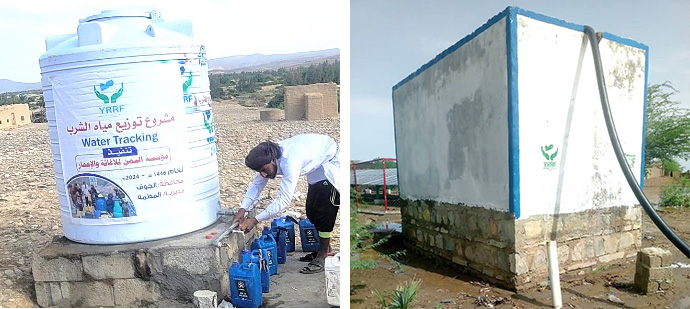
Water tanks and water trucking for internally displaced populations. Photo: YRRF
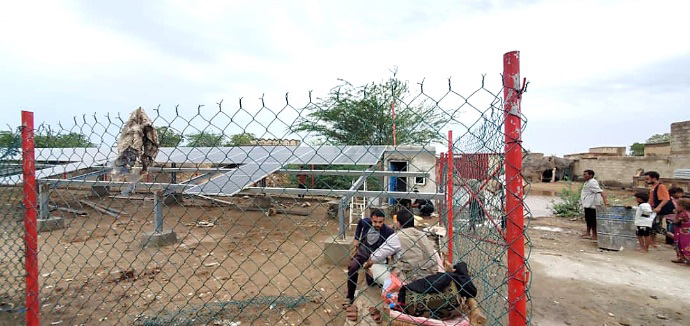
Solar panels power the well to provide water to multiple villages. Photo: YRRF
Clean drinking water is essential to life, especially in times of crisis. In flood-affected areas, we distributed more than 2,100 filters and 4,200 barrels, ensuring access to safe drinking water for nearly 20,000 people. In regions where infrastructure no longer functions, we completed a well project in Hodeidah, installed solar power to supply water to several villages, and supported water trucking services for displaced families.
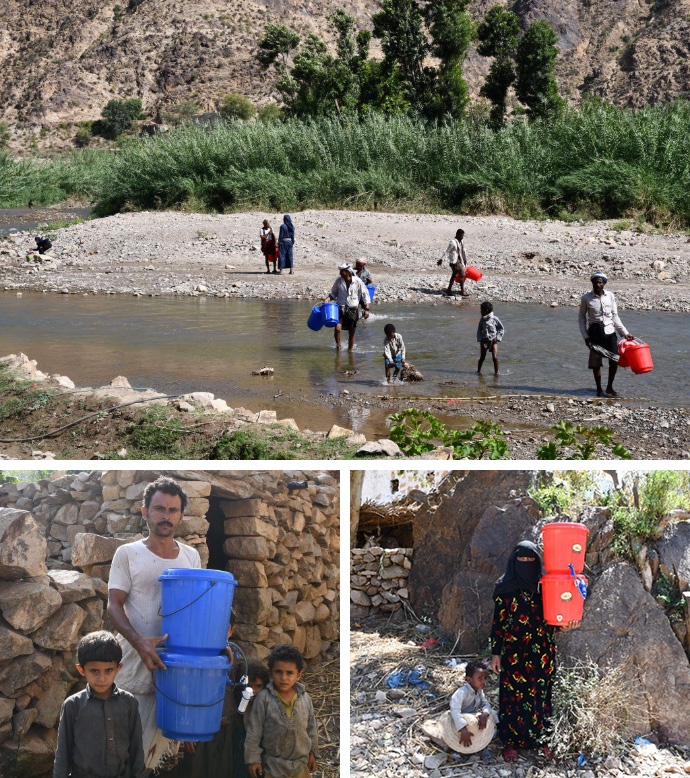
Water filter distribution to flood-affected communities. Photos: YRRF
In Sanaa, we installed more than 110 solar water heaters, serving nearly 1,000 individuals. In areas where fuel and electricity are limited, these systems offer reliable access to heated water for cooking, bathing, and cleaning. This consistent access helps reduce the risk of foodborne illnesses, skin infections, and other preventable health issues, especially in overcrowded or resource-limited settings.
Building Locally Led Health Systems
Everything we do is centered on making care possible in places where systems have collapsed. Whether we are training midwives, supporting clinics, or bringing clean water to a community, our focus remains the same: to create lasting impact through local leadership and practical support.
As conversations about innovation in global health continue, including the role of digital tools and artificial intelligence, we see value in staying connected to these evolving approaches. While we remain grounded in the realities before us, we also believe in the potential of responsible innovation to one day support and expand this kind of frontline work.
Driving Collective Action Toward SDG 3
There is no single solution to the health crisis in Yemen. But with each trained midwife, each recovered child, and each restored water system, we make real progress where it matters most. As part of the GlobalWA community, we are proud to stand alongside others working to make Sustainable Development Goal 3 a reality. The barriers are many – years of conflict, damaged infrastructure, and displacement – but the commitment to overcome them is just as strong. Together, we can continue delivering care and restoring hope where it is needed most. Learn more about our work at yemenfoundation.org.